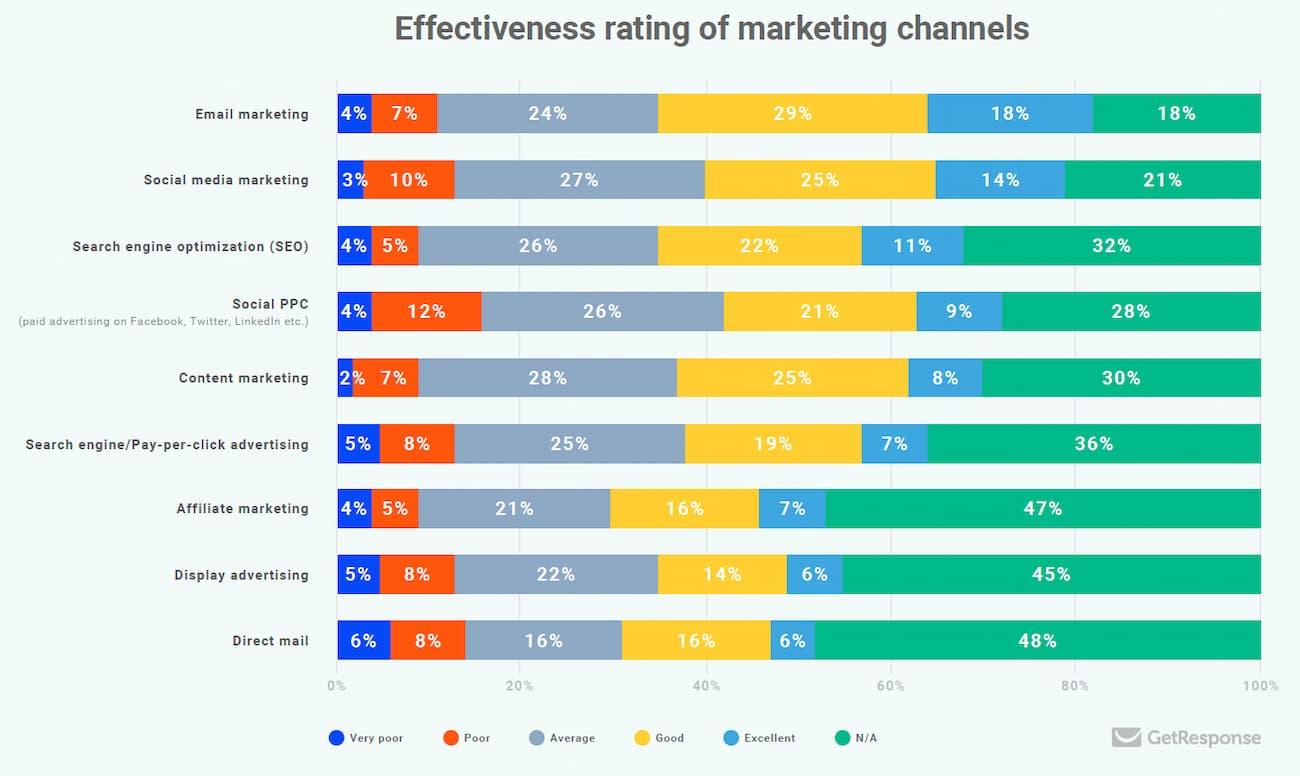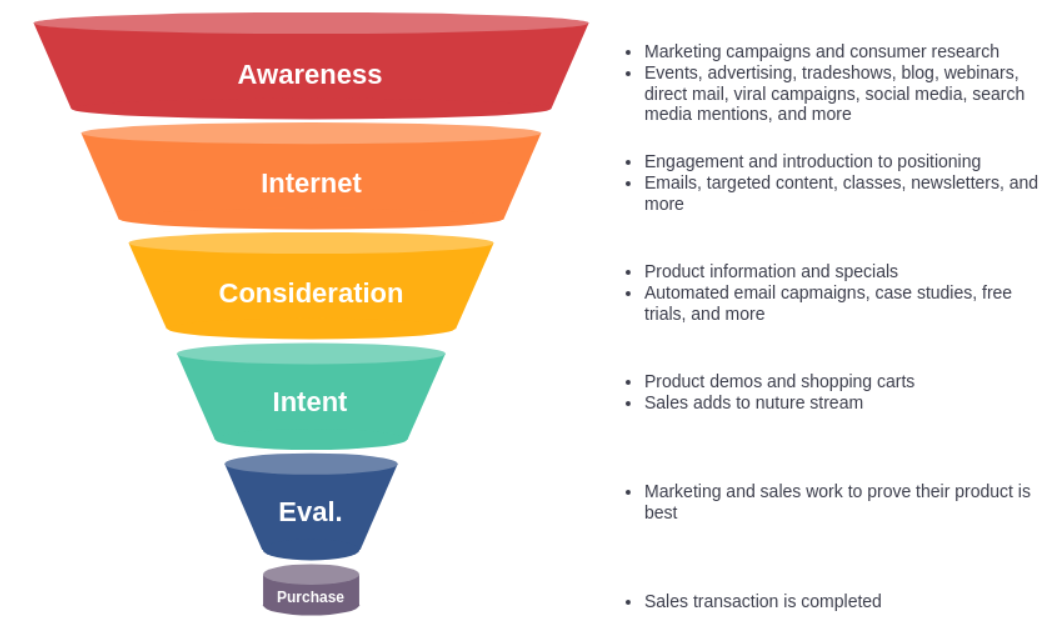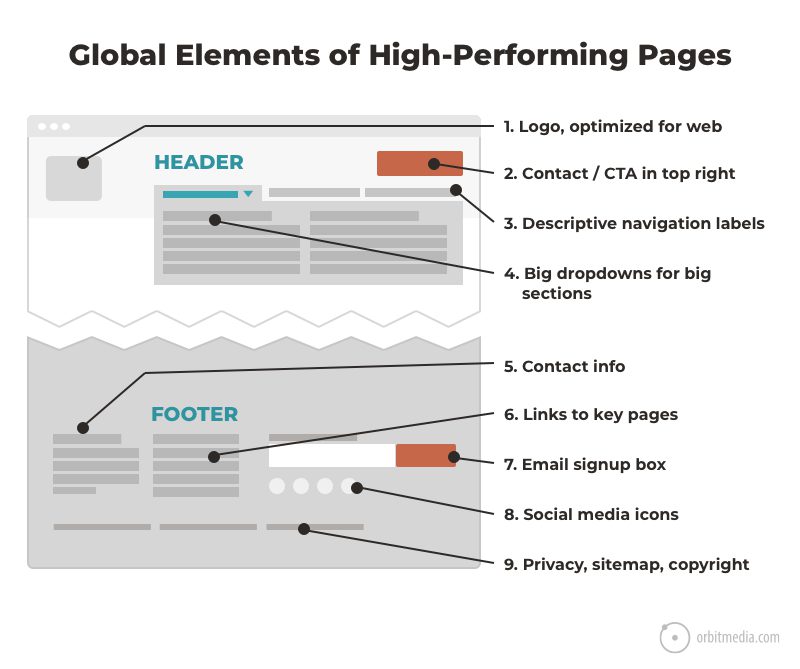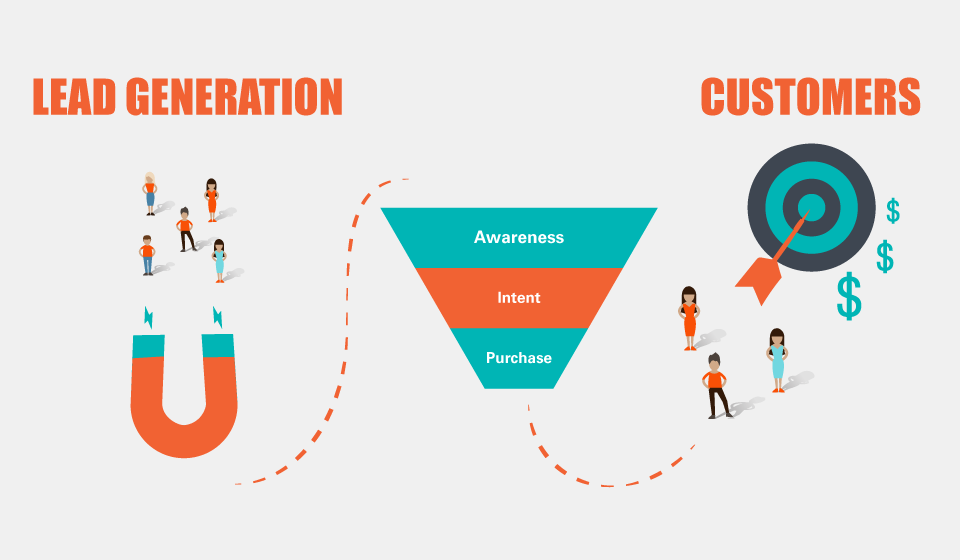Which is better for your business: Social Media or Search Engine Optimization (SEO)?
August 10, 2022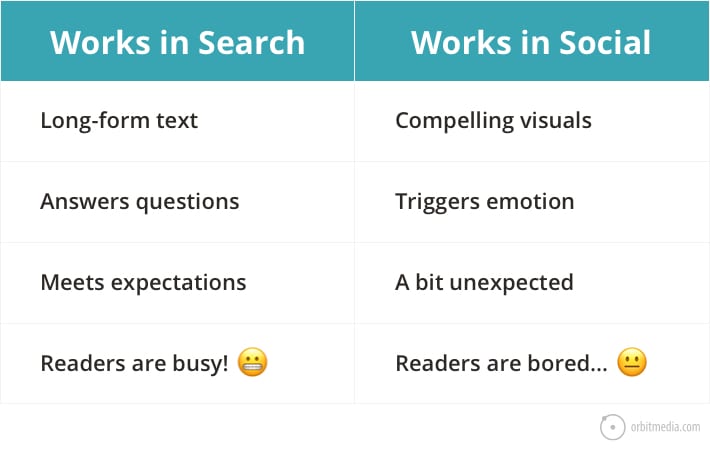
Both are inbound.
The actions and outcomes of social media and SEO are very different. Let’s look at the 9 differences between them.

How are they different? Which is better? Which should you use?
Social media and search engine optimization are both ways to promote articles in content marketing. They are both inbound channels. But they are very different from each other. In fact, social and search are opposites in many ways.
A content marketer does three things: create content, promote content and measure results. Search and social are two of the main ways to promote content.
As you can see from this diagram, they support the funnel in different ways.
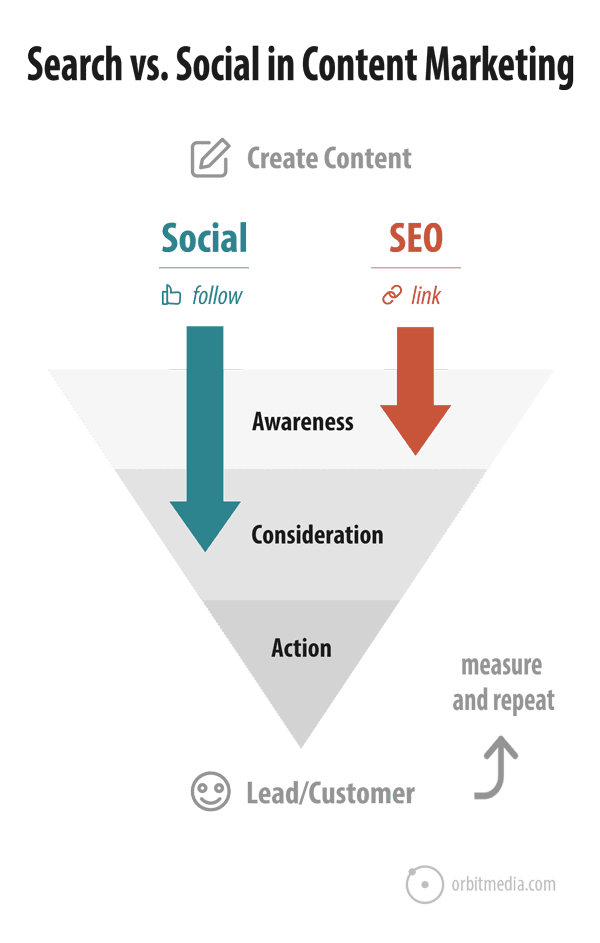
First, here’s the big picture:
- What is search engine optimization (SEO)?
SEO is about being discovered and getting traffic through search engine rankings. It fills the top of the funnel and creates awareness. - What is social media marketing?
Social media is about connecting, building relationships and getting traffic from social media networks. It strengthens the middle of the funnel and creates engagement.
Go one level deeper and you’ll find that the audiences, the actions and the outcomes are all very different.
Let’s takes a close look at the major differences between social and search. This post will help you answer the search vs. social question for yourself, decide which content to promote in which channel, how to spend your time and where to set your expectations.
Here’s the breakdown of the differences (and similarities) between social media and SEO.
1. Audience and intent: The mindset of your potential visitors
This is the fundamental difference between these two channels. One group is holding a mouse or tapping a screen. The other is typing on a keyboard.
- Social Media
You know a lot about who these people are, but very little about what they are thinking. They’re clicking around. They’re browsing. That’s why visitors from social media marketing are less likely to act. They were cruising through a social network when they found you. They have weak intent, but they are more likely to share and spread awareness. Social fans and followers often influence potential buyers.
- Search Optimization
You know a lot about what they are thinking, but very little about who they are. They just searched. They’re looking for something. That’s why visitors from search are more likely to be ready to buy, but less likely to share and interact. These visitors enter with a specific purpose, need or question. They have strong intent.
2. Topics: What works where
Which topics work well in which channel? Once you have an instinct for it, you’ll know where to promote any piece of content.
- Social Media
Content that stirs an emotional response often does best, especially emotions such as anxiety, anger and awe. Trending topics often do well in social media.
- Search Optimization
Research-based content often performs best, such as detailed, how-to instructional posts and articles that answer common questions. Evergreen topics that don’t quickly go out of style often do well in search engine marketing.
3. Formats: Which types of content will perform
Text? Video? Audio? Images? What content marketing formats are best for each channel?
- Social Media
Visuals perform best in social media since they help capture the attention in fast moving social streams. Images and video are the most shared content on the web. Posts with images generate the most likes and shares.Punchy, emotional headlines work well.
- Search Optimization
Long form text performs best in search. The average page that ranks high in Google has 1500+ words. There’s a good reason Google loves Wikipedia: detailed articles. See the Ideal Length Guidelines for more information.Longer descriptive headlines work well.
4. Speed: How long before you’ll see results
How much time and patience is required? How soon will you see results from search and social?
- Social Media
Although growing a following takes time, social media posts appear instantly and results can happen within minutes.
- Search Optimization
SEO is typically slow and uncertain. Even highly relevant pages take days to get indexed and rank. It often takes years to build up enough credibility to compete for the most valuable phrases.
5. Upper limits: The size of the prize
How much success is possible? What is the upside for the very successful marketer?
- Social Media
There is virtually no limit to the amount of traffic a page can get from social media. A huge number of people may share a piece of content. If you’ve ever seen the Analytics for content that has “gone viral,” you know just how far and how fast things can spread.
- Search Optimization
There is a ceiling to the amount of traffic a page will get from a search engine. Traffic will never exceed the number of people who search for that phrase each day. The total demand for the topic (the search volume) is the maximum amount of traffic the page will get from search engines.
6. Durability: How long success will last
Like sprints and marathons, the actions and efforts in search and social are completely different.
- Social Media
Most visibility and traffic happens within minutes of posting. Although response may be quick, social media requires a continuous, ongoing effort.
- Search Optimization
Once a page is ranking, it may have durable visibility, creating an ongoing, passive source of visitors. Depending on the phrase and the page, high rankings may endure for weeks or months.
7. Measurement: How to report on success
The traffic you win from each channel is visible in your Google Analytics. But the number may not be accurate. How do you measure social and search outcomes?
- Social Media
It’s easy to measure social engagement, but hard to measure reach and impressions. Shares, likes and comments are all highly visible and can be reported using a tool like Buzzsumo. Also, each social network offers its own reporting. But it’s hard to measure reach. The total visibility and traffic of all social activity is not easy to report on. There are many platforms and each has its own reports. Social traffic reports in Google Analytics are not very accurate.
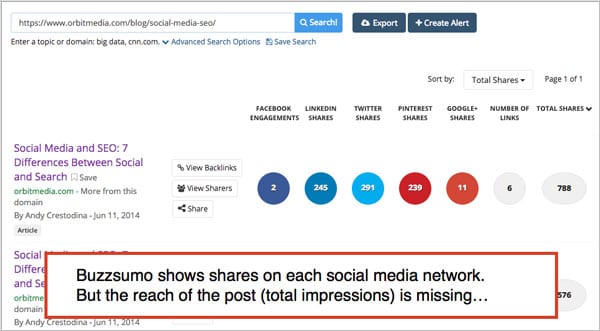
- Search Optimization
It’s easy to measure the reach, but harder to measure engagement. The total visibility and traffic from search is in your Queries report, which shows keyphrase, impressions and clicks. It’s easy to check your rankings for every phrase, but it’s harder to measure engagement. Behavior metrics per keyword are not provided, so you never know which keyphrase led to which activity on your website.
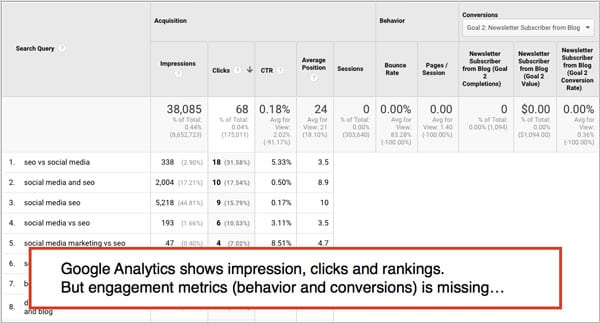
8. KPIs: Those little goals on the path to success
Are you making progress? What goals and KPIs should we be tracking along the way?
- Social Media
Followers are the most obvious and visible way to measure growth. But there’s more to life than followers… Build relationships, have meaningful conversations and grow your network. Genuine friendships are the best outcome of social media. Don’t be distracted by vanity metrics.
- Search Optimization
Links are the greatest indication of long term success. But there’s more to life than links… Rankings are more important. But even rankings aren’t your ultimate goal. You’re looking for traffic, a steady stream of targeted visitors. Don’t be distracted by vanity metrics.
9. Interdependence
Although social media activity is not a search ranking factor in Google, social media marketing is a big part of SEO. Here’s how they are directly connected:
- Social Media
High ranking content attracts visitors that may follow, comment and share. Visibility from search increases social engagement over the long run. Also, social media profiles often rank high when people search for brands and names.
- Search Optimization
Smart SEOs know that links, mentions and rankings are the outcome of relationships. Blogger relations, PR and many other search tactics are actually very social activities. Skills such as list building, outreach and pitching are critical to SEO.

Both SEO and social media are all about connecting with people. They both benefit from research and data. They come from different directions but end up in the same place: a meaningful connection with an audience.
Bonus: The click
The need for a good click through rate (CTR) is common to both of these channels. Appearing in a social stream or a search results page means nothing unless someone clicks!
So optimizing for the click is the one skill that every digital marketer needs, and that includes email marketers.
What’d we miss? Got something to add? Share your view with other readers or let us know if you agree…
Article by Andy Crestodina of Orbit Media
